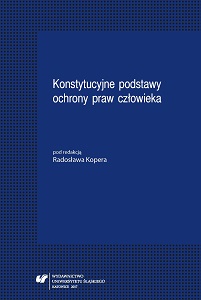Ochrona praw dziecka w Konstytucji Rzeczypospolitej Polskiej
Protection of Children’s Rights in the Constitution of the Republic of Poland
Author(s): Michalina Drózd‑Żyła, Ksenia Pilarz
Subject(s): Law, Constitution, Jurisprudence, Constitutional Law, Human Rights and Humanitarian Law
Published by: Wydawnictwo Uniwersytetu Śląskiego
Summary/Abstract: A thorough analysis of children’s rights can lead to the conclusion that the status of a child should not be limited only to the directly relevant regulations. Human rights are based on the rule of subjective universalism, which means that they pertain to all subjects. It could be, then, argued that any child automatically becomes the subject of all rights and freedoms that benefit all people, while their scope, in comparison to an adult who possesses full capacity in the eyes of the law, remains temporarily restricted. Children’s rights constitute, therefore, the natural consequence of human rights. They are inherent, universal, and inalienable. No child could be, therefore, deprived of these rights, which, in turn, should be respected and obeyed by all parents, authorities, and the state itself. Even though the burden of upbringing lies on the shoulders of the parents, the state is required to enact such laws that allow the child to be fully protected, including the transference of guardianship to special authorities and institutions. That is why in Poland, apart from the institution of the Polish Ombudsman, there exists the institution of the Ombudsman for Children, who guards the rights and freedoms of children as delineates in the Constitution of the Republic of Poland, Convention on the Rights of the Child and other regulations.
Book: Konstytucyjne podstawy ochrony praw człowieka
- Page Range: 97-108
- Page Count: 12
- Publication Year: 2016
- Language: Polish
- Content File-PDF

